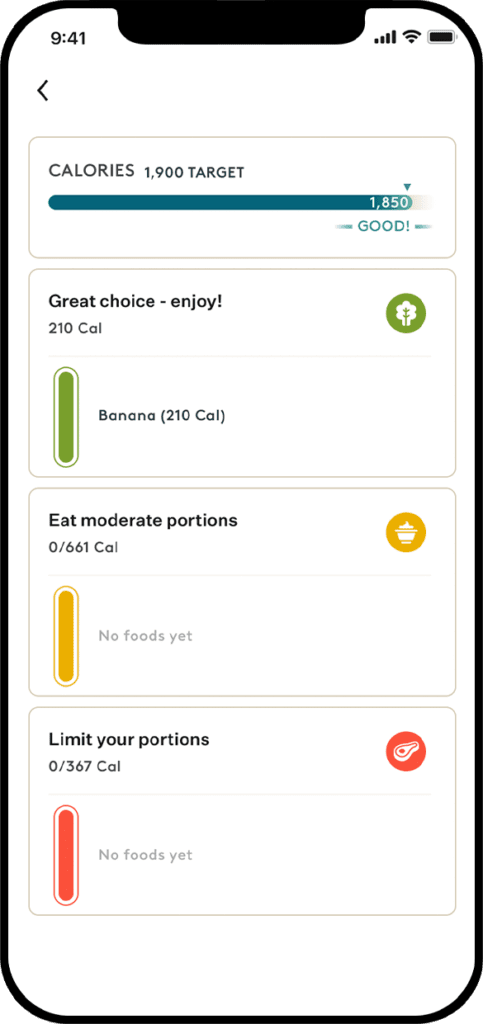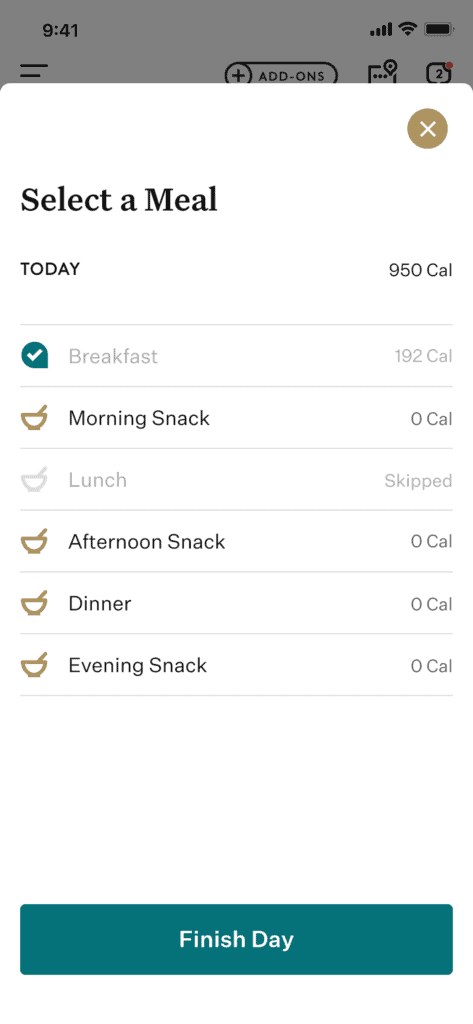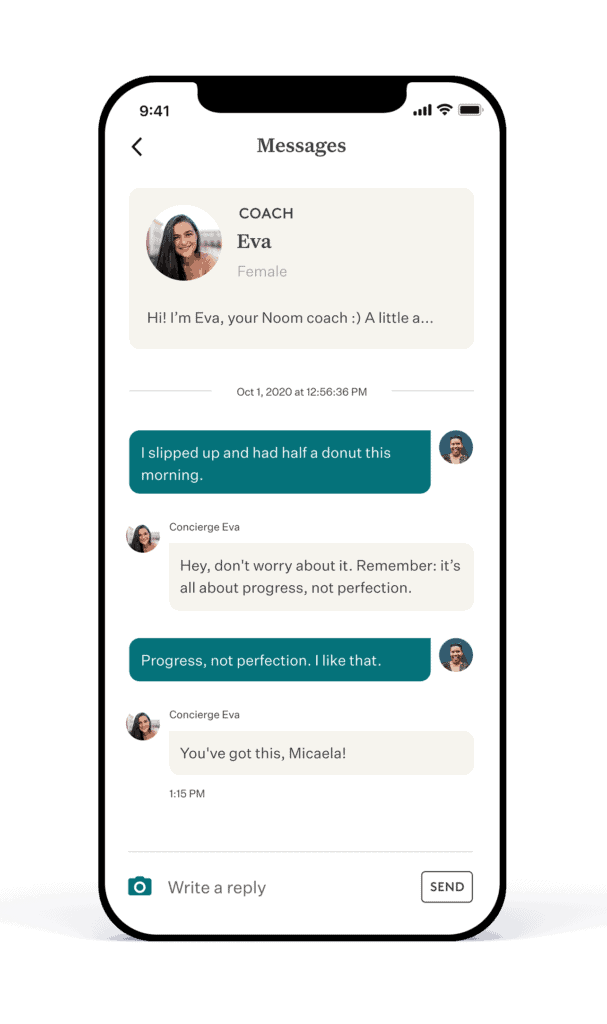How Noom can help | Making healthy food choices | Addressing the emotional side | Getting 1:1 support | Incorporating exercise
- Noom’s customizable program helps women in perimenopause or menopause overcome their unique weight loss challenges.
- Our Daily Lessons provide tools to address common menopause issues—like stress eating, sleep disturbances, and prioritizing self-care.
- A guide can help tailor the program to your needs and offer strategies to help stay on track.
Weight gain during menopause isn’t inevitable—but it’s definitely common.
While it varies from woman to woman, research shows that the average woman gains 1.5 pounds per year during her 50s and 60s.
Add to the mix mood changes, hot flashes, and the enhanced stressors of middle age, and shedding those extra pounds can feel like a losing battle.
But it’s not.
Noom is here to help.
Noom Weight’s comprehensive program will help you meet your weight loss goals and create new, sustainable habits for the long term.
Note: Please consult with your medical provider before making dietary changes.
Why use Noom for weight loss during menopause?
Menopause marks the end of a woman’s reproductive years.
Perimenopause—the period leading up to menopause—typically begins in your 40s.
Once you’ve gone 12 consecutive months without a menstrual cycle, you’ve officially reached menopause, which usually occurs in your 50s.
Wherever you’re at in this natural transition, weight loss isn’t a simple matter of willpower. You’re facing unique weight loss obstacles that are tough to tackle on your own.
- Hormonal imbalances: Fluctuations in estrogen, progesterone, progesterone, and other hormones can contribute to weight gain—especially in your midsection—as well as hot flashes and other uncomfortable physical symptoms.
- Increased appetite: Levels of the “hunger hormone” ghrelin are higher in perimenopausal women. Low estrogen can also impair the function of leptin and neuropeptide Y, hormones that control fullness and appetite.
- Mood changes and feeling more stressed: Mood swings, increased irritability, depression, and anxiety can all occur during perimenopause due to hormone imbalances. With a decrease in estrogen, women also experience a rise in the “stress hormone” cortisol, which can cause food cravings, fatigue, and a low sex drive.
- Sleep disruptions: Hot flashes and hormonal changes make for miserable sleep for perimenopausal women. In turn, sleep deprivation increases fatigue, stress, and food cravings.
The good news? You don’t have to figure it out alone.
Whether you’re using Noom for menopause weight loss or joining Noom postmenopause, we’re here to help you lose weight and thrive.
Lose 48% more weight
with Noom than just meds alone
Make healthy food choices with Noom’s color-coding system
Some women struggle with weight gain during perimenopause. Others don’t gain a single pound.
But for those who do, eating “salad forever” is not a realistic—or sustainable—weight loss plan.
Here’s why:
When your restrictive diet ends (or fails), you will likely gain back any pounds you lost in the form of rebound weight gain.
The cycle eventually leaves you feeling frustrated, fed up, and burned out.
Noom is different.
We won’t make you give up your favorite foods or food groups. We focus on sustainable, nutritional eating and habits that lead to weight loss for the long term.
The key is our three-color food system. Women going through menopause have told us that this system was the key to helping them hit their target weight.

First, we calculate your daily calorie target based on your age, gender, and other factors that affect your goals—such as the rate at which you want to lose weight.
With Noom Weight, all foods are categorized as green, yellow, and orange based on caloric density (CD).
- Green foods will fill you up on the least number of calories. Think: veggies, fruits, and whole grains.
- Yellow foods have more calories. Think: chicken and fish, avocados, starches, beans, and low-fat dairy.
- Orange foods tend to have the most calories and/or have the least nutrients. But that doesn’t mean they’re good or bad. This simply means that you’ll feel less full having 100 calories worth of potato chips than if you ate 100 calories worth of grapes.
You’ll enter everything you eat in the Noom Weight app. By tracking everything you eat (it only takes a moment to do so), you see how your choices align with your goals.
To be clear, no food is off-limits.
Noom for weight loss during menopause isn’t about restricting or starving yourself. And if you’re using Noom postmenopause, you’ll follow the same approach.
You’ll learn how to make choices that are nutritionally rewarding, keep you feeling satisfied on fewer calories, and leave space for the foods you love.
Plus, research has shown that the more you track what you eat, the likelier you are to reach your goal weight.
So, go ahead and have a cupcake at your granddaughter’s birthday party. Mix up the spaghetti and meatballs for the family get-together this weekend.
Just be sure to balance those orange foods with green and yellow choices to stay within your daily calorie range.
Address emotional challenges of menopause weight loss with Daily Lessons
With Noom Weight, you start every day with five to 15 minutes of quick, digestible, psychology-focused lessons.
They’ll explore the “why” behind your eating behaviors and help you build new habits.
Does the following scenario sound familiar?
These days, you feel like you could eat an entire round of brie without making a dent in your hunger.
You’re having hot flashes and haven’t slept well in weeks.
Increased cortisol levels have intensified your stress responses, and you find yourself constantly reaching for chocolate-covered pretzels just to cope.
I’m going through menopause, you think, so I’ll never lose weight.
At Noom, we call this “all or nothing thinking.”
It’s a common thought distortion for people struggling to lose weight. Our Daily Lessons are designed to help you break that script.
For many women, menopause occurs at an already stressful time in life, when you might be dealing with elderly parents, empty nest syndrome, career pressures, and your own concerns about aging.
You need to find alternatives to using food as a crutch, and the Daily Lessons do just that—in a fun, easy way.

These mini-lessons don’t just focus on food.
You’ll explore ins and outs of your metabolism and how it slows down as we age.
You’ll also tackle other challenges related to weight loss, like developing healthy sleep habits, identifying and overcoming emotional eating, and incorporating self-care.
Soon, you’ll recognize when you’re reaching for those chocolate-covered pretzels because you’re truly hungry or because you’re feeling stressed.
In place of your go-to comfort food, we’ll teach you alternate strategies like meditation, journaling, and listening to music.
Noom’s Daily Lessons are an invitation to focus on you.
Get support from Noom’s guides
Over the years, Noom’s trained guides have supported many Noomers with weight loss before, during, and postmenopause.
They’ll help you focus your energy to achieve meaningful results and will support you through those highs and lows.

Let your guide know your unique circumstances, and they’ll point you in the right direction and provide additional resources.
Did one of your favorite trigger foods get the best of you? Want some healthy snack ideas? Need a pep talk?
Your guide will help you focus on your goals and stick to them.
A Noom Weight circles group will also have your back.
Come together with 10 to 15 other Noomers to post weight-loss tips, offer accountability and motivation, and recognize achievements, big and small.
Incorporate exercise gradually through our fitness tracker
It’s no secret that we tend to become more sedentary as we age. This means you may become less active at the exact time in life when more activity is vital to your health.
For women going through menopause, exercise is important.
Exercise helps not only with weight loss but also with heading off osteoporosis, heart disease, and other age-related conditions. Plus, it’s a natural mood booster.
But don’t worry. We won’t push you to exercise.
But when you feel ready, we’ll help you take those first steps toward fitness. You’ll start with 200 steps at a time (using the Noom Weight app’s pedometer) and add a little bit more each day.
You might begin just by walking up and down your driveway a few times a day. Noom Weight helps you build on that progress.
Before you know it, you’ll be walking two to three miles a day, five days a week.
Just like foods, we don’t believe there are “good” and “bad” workouts. We want to encourage you to find the ones that are most enjoyable for you.
Use the Noom Weight app’s fitness tracker to find fun exercises—from Pilates to ping pong—and monitor your activity.
Just log the activity and the amount of time it took. Noom Weight will calculate the calories burned for you.
Get started with Noom Weight
Whether you’re using Noom for menopause weight loss or joining Noom postmenopause, we’re here to help.
Noom Weight empowers users with psychology-backed tips and resources, so they’re able to build sustainable, healthy habits. Sign up for your free trial today.



